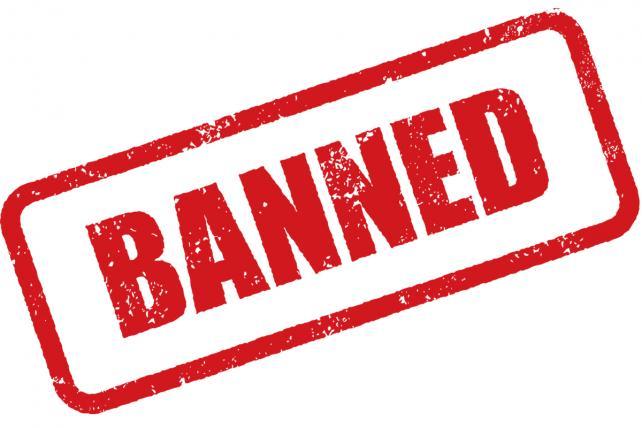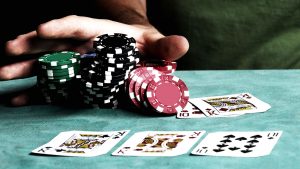How to Get Kicked Off Online Poker
People act differently online than they do in person. The anonymity of the internet, and the fact that people may feel less inhibited writing than speaking, leads people to behave in ways that might never occur to them in the “real” world. Online poker is often the scene of conduct you won’t find inside a live card room.
Playing in the safety of their own homes, insulated from direct observation by a computer screen and hiding behind a pseudonym, online players may think they can say and do anything without facing consequences. But anonymity does not excuse bad behavior, and if you stray outside the bounds of decent conduct you might find yourself getting tossed out the virtual door of your favorite online poker room.

There are as many ways to get in trouble online as there are cards in the deck, but here are a few of the most common and egregious:
Profane and Obscene Language:
Most poker sites have software that monitors and screens out your common, run-of-the-mill expletives from chat. That’s why after a hotly contested hand it’s not unusual to read something like “How the XXXX can you play J-4 you XXXXXXX?” But frustrated players often aren’t satisfied with conveying merely frustration; they want their opponents to know EXACTLY what they think of their play. And so the chat window turns into what appears to be an amped-up “Hooked On Phonics” lesson, with creative spellings and letter combinations invented to fool the screening software.
While it does not take much inspiration to replace “f” with “ph” and “que” for “ck,” you will find other lexicographical constructs that would’ve impressed James Joyce. However, it won’t impress the management of most poker sites – if other players complain about your language, fabricated or otherwise, you’re liable to find yourself given a stern warning and, if that doesn’t work, your chat privileges temporarily revoked. If you still can’t control yourself your chat might be permanently silenced or your entire account terminated, in extreme cases.
Abusive Comments:
One lesson taught in just about every poker book is that good players make fewer mistakes than bad players, and that’s how good players win the money. So why is it that, after suffering a particularly ludicrous beat, some players fly completely off the handle and start berating and belittling the poor soul who skunked them? Insulting a poor play has a triply-negative effect: It sours the atmosphere at the table; your insults might chase the poor player away, meaning you’ve lost any chance of winning your money back (and more); and you might actually spur the fish to improve his play. As Mike Caro “The Mad Genius of Poker” says, “Weak opponents will give the most money to players who make winning with bad hands fun and losing painless. Try to be one of the players they don’t mind losing to.” …
It’s quite a bit easier to insult the play of a computerized avatar than a hulking colossus sitting across a real table. But it isn’t more acceptable. Online poker rooms have little patience for abusive players who chase away other clients and ruin the game for innocent bystanders. And if the complaints keep coming you might never get a chance to show your superior skill again — at least not at that particular site. As the saying goes, revenge is a dish best served cold. You’re better off typing a neutral “nh” after absorbing a maddening beat and waiting for a chance at real satisfaction — winning your money back.
Mind Your Own Business:
Once you’ve mucked your cards you no longer have a right to be involved in the current hand. Chatting quietly with your neighbor is one thing, razzing or egging on the players still involved in the action is quite another. Saying, “Oh, that’s a bluff!” after a check-raise or “Come on, no way does he have the straight, you gotta call here!” after the river card is turned is a sure way to anger the Poker Gods — not to mention the folks trying to finish out the hand. Butting in when you aren’t in the hand is an unforgivable breach of poker etiquette, and one most likely to anger your fellow players.
A Bit Too Much Information:
Conversely, talking too much about your OWN hand can get you in trouble. Most casinos have a rule that if you reveal your hole cards during a hand, & those cards are dead. Online poker sites don’t have the ability to detect immediately if you’ve committed that offense and kill your hand, but if your irritated opponent reports you, it’s no problem for the site management to review both your hand and your chat and sanction you. So if you bluff on the river and think you can induce a fold by typing, “I think I have an ace…” you might win the hand, but lose a lot more in the long run.
No Soliciting:
In card rooms they’re called railbirds, down-on-their-luck players who hang around hoping to hit up a winning player for a stake. While it doesn’t happen as often online, some people will chat up players with big stacks in front of them, asking for a loan so they can get back in the game. Most players don’t like to be hit up even by people they know, so it’s unlikely they’ll appreciate getting touched by someone they’ve not only never met but also have never SEEN.
Not the U.N.:
Poker is popular all over the world, and some of the most famous players come from countries other than the United States. It’s not unusual to sit down at a table online and find you’re up against players from Sweden or Costa Rica or Singapore. But while online sites welcome players from every corner of the globe, their staff can’t speak the native language of every player. And so most sites have a rule that only English can be spoken during play, to prevent even the appearance of collusion during the game.
The “C” word:
Perhaps the most controversial aspect of online poker is the potential for collusion among two or more players at the table. Perhaps sitting in the same room, using instant messaging software, or even communicating by telephone, cheats don’t find it difficult to sit at the same online poker table and work as a team against the other players. In live poker colluding is much more difficult because other players (and card room employees) are on the lookout for the signs and gestures meant to convey information. That’s impossible for online sites, but they still have tools to try to identify when players are working together. Online casinos can review hands and see the cards that players held and how they were played, and from there decide if anything untoward took place. There is no burden of proof that the site has to establish. If they believe you were cheating, they can terminate your account on the spot and send you on your way.
If there’s one constant in the rules that govern online behavior, it’s that poker sites will require other players to step up and report the abuse. There are so many players sitting at so many tables with so many hands dealt per hour that it’s impossible for internet casinos to see it all. If you believe that another player is out of line, either by word or by deed, you have the right to stand up and bring that behavior to the attention of management. Poker is a game that treasures its wild-and-woolly past, and if your skin is eggshell-thin you might want to take up a more genteel pursuit. But that doesn’t mean you have to just sit there and let a boor or a cheat ruin your enjoyment of the game. You can’t play winning poker without standing up to the occasional bully, and that’s the case whether you have cards in your hand or not.





